So excited we went to The Real Greek for Book Club this month. I have been eyeing off this restaurant chain ever since I arrived in London and I'm happy to say it didn't disappoint. YUMMMMMY! 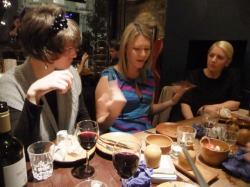 Becky mid point-making We may have got a little over excited about the saganaki, but we had to prove to Lou W that her previous bad experience with the fried cheese dish was not the norm. 4 saganaki entrees later, we had her convinced. mmmmm..... cheeeeeeeese. 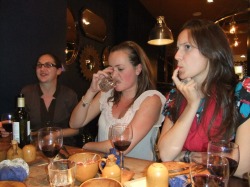 Concentration mode Bonus points to us for having full attendance and high readership of the book - always a good start, especially given the book was a classic. Good balance of book/non book discussion too. But we did come to the conclusion that while the book wasn't bad - there wasn't really too much to discuss here. Good book, not great for book club. Interesting distinction, something I think we are beginning to think about a little more now that we have been running for more than 4 years. 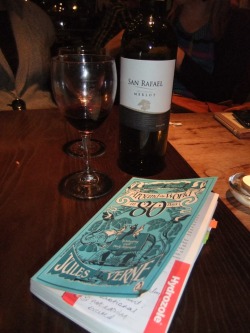 My best Edwina style photo
There had to be some benefit for Clare and I swapping countries at the same time and here it is! We just swapped Book Clubs :) I must admit I was a bit nervous about attending the London book club - there had been talks of initiations, but thankfully we just ate a lot of mussels instead. I can't say it was the best readership ever seen... but I think nearly everyone had started, the problem was everyone got lost in the never-ending nun section of the book!! I don't blame 'em personally - if I had a day job at the moment I might have been in the same position... BORING. And anyway, Dana had some much more pressing issues she needed to discuss with us... much more interesting than nuns who've taken a vow of silence. Something else I've just realised we should have discussed and didn't, is why the hell is Jackie the only one not wearing a cream top??? We must have accidentally left her off the memo. Sorry Jacks, make sure you check the dress code before you leave home next time.
Girls check out www.readitswapit.co.uk - this is a website which allows you to swap books your have read for other people's pre-read books... a simple idea which saves you from having piles of dusty books lying around the house AND saves you money
It was a sunny Friday afternoon, the beginning of a long weekend, a great book which everyone had read, and plenty of vino and cider ... all the ingredients for a classic book club (only a Brazillian masseuse could have made it any better, as Dana kept reminding us!!) and it lived up to expectations to be a fantastic evening.
I love this book - I first read it about a year ago and after getting over the Americaness of it, the gimicks and the fluff, was totally enthralled and couldn't put it down. I read it again the week before book club and was amazed all over again at how much I loved it. This time I found I was more sceptical of Liz's cuteness but I was also more profoundly touched by her insights.
I really enjoy reading books by journalists ("Almost French" springs to mind) - I find they have a great clarity in their writing, are very methodical in their storytelling, and have a gift for bringing lots of elements together to weave a very full picture for the reader. For me, this book did all this very well - I particularly liked the information she was able to bring together - whether about how the Italian language originated to what "run amok" means.
The main qualm people had with EPL was Liz's self-centredness - that this was HER problem, HER trip, she was in an amazing ashram in India but actually what was bothering her was HER ex-boyfriend etc. etc. ... I was surprised when people raised this concern as it had not occured to me while reading the book - but in hindsight I could see what they meant, and then it did start to annoy me a too!! For me this gets lumped in with the cuteness, the convenience (a journey of discovery through places with the letter "I"), the corny-ness ie. the bits that you can push to the side, and for me, once you do that, there is so much to love about this book ...
* the idea of looking at the world through your heart but with your feet firmly planted on the ground
* Liz's descriptions of food ... I was hungry throughout the whole book!!
* I loved the tradition on Thanksgiving to go around and share what you are grateful for ... can we start this as a book club tradition in November??
* the challenging idea of ego; that it tries to convince you that you're flawed and broken and alone instead of whole
* the idea that you shouldn't quit because something is challenging - in fact the opposite - when something IS challenging, there's probably a reason why
* idea of destiny as 1 part divine grace 1 part willful self-effort
* controlling your throughts - no harbouring of negative thoughts
Some bits I found interesting but hard to believe ... Liz describes the Gurugita is a text of unimaginable power ... do you believe this is possible? ... the ceremony to let go of her marriage and divorce ... the petition at the beginning of the book for her divorce to come through ...
I thought the ending was brilliant (the idea that the future-Liz had spoken to Liz the night on the bathroom floor when she heard a voice tell her to go back to bed) - I hadn't picked it, and I don't think anyone at book club had - it was interesting, insightful and unexpected ... which I think sums up this book well.
For me, this book joins "Tuesdays With Morrie" and "Veronika Decides To Die" (yes, my first 2 book club choices) as a reminder of how to live life and I know it will be a book I read at least a couple of times a year.
It took several days and a lot of energy and concentration to read 2 introductions and then Huxley's introduction before I even got to Brave New World. These definitely serve the purpose of bounders - you make sure that the people who get to the novel "the good bits" really wanted to be there! But apart from that, the introductions did little for me (although I was interested to read that when zippers were first invented, priests preached against them as evil because it meant you could get your clothes off so much more quickly!)... sorry getting distracted already - this is book club, not introduction club.
I didn't expect to like this book - I'm not a huge fan of sci-fi and I remember watching "1984" and being pretty traumatised by it.
But I did. I love it. I love reading "classics" and discovering that they truly fulfil the promise such a title holds.
For me what I loved the most was Huxley's writing. I found it to be a perfect ix of interesting language which was readable at the same time - the worlds made me read faster and understand more, rather than causing me to stumble on difficult phrasing, awkward sentences or unnecessarily pretentious words, as can sometimes be the way when someone tries to write a classic. The collections of words he used conjured up clear pictures, moods and atmospheres so that I became totally absorbed by the book and could imagine so clearly what The World State was like. It was a pleasure to read this book, even when the ideas were challenging and uncomfortable. To me, this is how reading should be.
The success of his words supports his very well thought-out world view. Most area of life are addressed in the book - not in an obvious "this is how the world is" way, but through descriptions woven through the story. One review I read of the book described his world view as "convincing" - I think this is a very good word for it. Interestingly (according to one of the introductions!) the main area of life he does not provide much detail on is food. I also was intrigued to know what the streets were life - were they clean? I'm guessing so. And what their houses were like. If they didn't have families then I guess everyone has to have their own house? Especially as houses are such sources of consumption.
Interestingly, Brave New World was inspired by the H. G. Wells' utopian novel Men Like Gods. Wells' optimistic vision of the future gave Huxley the idea to begin writing a parody of the novel, which became Brave New World. Contrary to the most popular optimist utopian novels of the time, Huxley sought to provide a frightening vision of the future. A big question for me is "is the world Huxley paints such a bad world?" - frightening yes, but then what are the alternatives? So many pros and cons, but a contentious one to throw out there.
Brave New World received nearly universal criticism from contemporary critics, although his work was later embraced. The American Library Association ranks Brave New World as #52 on their list of most challenged books. A number of countries have banned this book and schools have taken it off reading lists.
...So a lot of people for a long time have been disturbed by what they are reading in Brave New World - for me I was more fascinated by his predictions and how accurate some predictions of over 80 years ago have been. But I think the ruckus this book has caused is a sure sign of the success of the book - it gets under people's skin, it frightens people, it causes people to question the world and how they are living.
There is so much I loved about this book, and a few questions I had and a few bits that grated with me... did John the Savage really need to be Thomas' son? Lenina and Johns' never-quite-there love/relationship... did that annoy anyone else? Huxley seemed convinced that synthetic smells would play a large part in the future - the perfumes on tap, the scent organs... and takes on that?
But mostly I loved it and could talk and write about it for hours. There's so much to discuss - so much that makes us question how we are living now. When Huxley wrote Brave New World he said that the world he had written about was coming true much quicker than he thought it would.
Thank you Lou for choosing such a great, pneumatic book!
DISCUSS THE BOOK AND CLARE'S COMMENTS IN THE FORUM
* In case anyone has finished this month's book and is feeling like some supplementary reading, I recently read Helen Garner's The Spare Room - it has interesting parallels and stark differences to The Household Guide to Dying and I'd be interested to hear your thoughts on it. I love this months' book - I finished it last night - Simon got home to find me a blubbering mess!! I'll save the rest of my thoughts for Book Club and writing it up afterwards.
* In TimeOut there is a weekly column "How I write" - a couple of weeks ago, D J Taylor made this interesting observation which I'd never thought of, but which I really liked: "I start to write - in long-hand, but the way, believing that typing straight onto a computer encourages slackness of thought. Evelyn Waugh once suggested that writing styles change in response to technology. This the multi-clause layers of a Dickensian sentence derive from their origins in a dip pen; Heningway's staccato dialogue is the result of its being hammered out onto a manual typewriter, which makes you write like Gatling gun."
Cxo
We gathered at Dana's new place at Clapham Junction to discuss We Need to Talk About Kevin. We had a great turn out - Dana, Lou, Sar, Chris, Beckie Campbell, Tash (Sar's friend) and I - sadly, none of Dana's much-talked-up-hot flat mates, but given the silliness which usually comes with Book Club, this probably wasn't a bad thing!
After more cheese, crackers, pizza and dough balls (who knew they'd be so controversial!!) than was probably necessary, we gathered in the Story Room (not sure who decided to christen it as such, but the name seemed to stick?) to discuss the book. I read this book about 3 years ago after hearing Lionel Shriver interviewed. I loved this book. No, that would make me a huge psycho. We al agreed that this isn't a book you "love" - but I was deeply affected by this book. Of course the story was an amazingly powerful one, but for me what struck me th most was the power of the words and the storytelling - I found it amazing how involved I could become with words on the page - how I couldn't be so physically revolted, totally captivated and emotionally absorbed by words on the page.
At first the length of the book and the unpleasantness of the topic it deals with - which although not completely clears seems to loom in you consciousness as you are reading - made it hard going. But I found myself quickly wrapped in the characters and the story - I think Shriver's writing is that perfect mix of easy-read without being boring, that the words race past you and the book suddenly has taken over you so that you are reading as you walk from the bus stop to work.
Eva's letters - which I felt COULD have been a trying-hard-to-be-clever tool worked so well and provided and intriguing and emotional insight into the story through her eyes. There are so many topics to discuss with this book - I am looking forward to hearing what Sydney talked about... the story itself is so shocking and leaves nothing to the imagination, Kevin - nature vs nurture, was Eva's reluctance to become a mother a factor in his behaviour, why was Franklin so blinkered in his view of Kevin, why was Eva spared in the massacre, was Kevin a good person? Or was he just a plain psycho? ... why? How? How do we stop this happening again in our society? As sadly it seems to be becoming the case more and more. How does Eva move forward from here? is there the potential for Kevin to be rehabilitated? Or will he always be a danger to society?
A fantastic book Weens - a great choice, and I look forward to "talking about Kevin" with you soon.
Just back from August Book Club - drinks and dinner on Brick Lance, London with Lou Ward, Sara, Dana & Becky Campbell - we're growing! Opinions on the book were split 50-50 ... Lou had the deciding vote but was unable to make a decision either way (we had to explain to Dana and Becky that Lou has special immunity from reading the book each month!!!) ...but it was interesting as the arguments for and against the book were the same... I guess what Dana and Becky found charming idiosyncrasies (?), Sar and I found try-hard humour (yes, we were the haters!!) - ouch!
The language of the book - every day, simple, to the point, functional - suited the story and the voices which were speaking it, however the aside comments eg. "I want" (he pronounced it "I vant") seemed unnecessary - I think we could imaging the Ukrainian accent without these asides! It seemed annoying and without purpose. A number of us noted that the author repeatedly used long paragraphs made up of lists to describe the garden, the pantry contents, etc... these seemed tedious, and like she was trying to bump up the word count. We were all miffed by the history of tractors which was woven through the book - we all felt like this was meant to subtly and cleverly parallel to the plot of the story... but none of us could actually confirm whether or not this happened... largely due to the fact that everyone owned up to skimming through these pages!
We like the characters - we could picture them and the scenes of the story well. None of the characters was completely lovable - but that is realistic in itself. My personal favourite was Mike - that he put up with the hours of listening to Nikolai talk about tractors was grounds for sainthood! Nikolai was plain annoying and pathetic in perfect proportions. I proposed - and Dana seconded - that throughout the book it was easy to imagine it as a movie... although it didn't strike me a being a highly descriptive book, by the end of the novel, I could clearly picture the players and scenes... do you think this was a deliberate move by the author to sell the movie rights? Or me just being overly critical?!?
My favourite part of the book was when Vera and Nadekh come to some kind of understanding and way to move forward: "I realise that Vera and I have developed a different kind of intimacy, based not on talking but on practicalities - we have learned to be partners." This really ouched on something profound for me - I think a lot of relationships are like this, which is not a good or bad thing but an interesting observation. Whether or not Nadekh could actually have come to the conclusions she did... well, to me it seemed a bit quick and neat, but by then I think I was looking for faults. I thought this would have been a good place for the book to end. Instead we had to go THERE... what the HELL was the final scene with Nikolai and the nude yoga about?! In conclusion, I didn't altogether hate "A Short History of Tractors in Ukrainian" - I read it in 2 sittings and was quite engrossed by it. However I was often annoyed by the book - the language, the story, the characters, the smart-alek asides, what the purpose of the book was, the try-hard kookiness, the overly-clever parallel of the history of tractors - the work "contrived" spring to mind repeatedly.
PS the curry and wine got 5 out of 5 thumbs up.... so I guess it's Curry 1 - History of Tractors NIL
|



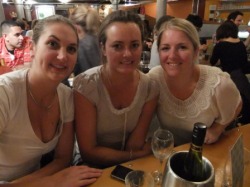
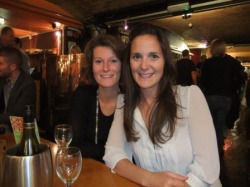
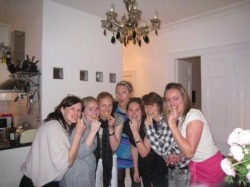
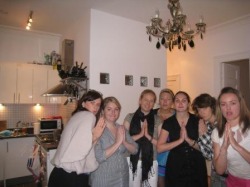
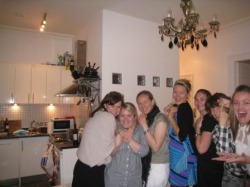
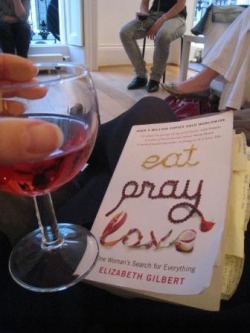







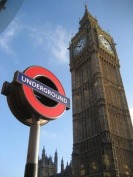
 RSS Feed
RSS Feed